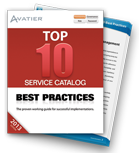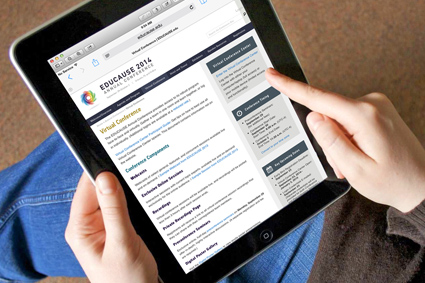Next week, the 2014 EDUCAUSE Conference showcases new instructional technology products, innovative educational services, and leadership best practices. With more than 250 exhibitors, four days of presentations, hot topic panels and a start-up alley, the event provides an opportunity to see how others address the key issues and challenges in higher education.
This year’s conference features separate agendas for face-to-face and virtual events. The face-to-face agenda includes an innovative Game Changers Business Competition, the CIO Experience, and a NEW–Senior Leadership Roundtable. The face-to-face events offer hands-on networking opportunities where you can engage your peers in learning about products and services for your institution.
As a new twist, this year I plan to participate in the virtual conference, which includes 63 webcasts as well as 18 exclusive online sessions. Since I cannot attend, I am grateful for the opportunity, because The 2014 EDUCAUSE Conference virtual agenda is loaded with learning. As an instructional technologist and information security professional, several “virtual” events immediately caught my attention.
Social Media and IT Governance in Higher Education
Starting Monday September 29th, the State of Social Media Guidance: Implications of Guidelines, Policies, and Practice in Higher Education surveys higher education’s use of social media across campus communities. This seminar, conducted by Tanya Joosten of University of Wisconsin-Milwaukee and Laura Pasquini from the University of North Texas, examines social media in postsecondary education and suggests ways to support students, teaching, and staff. This seminar seems a must for anyone who wants to leverage social medial for communication and learning.
Tuesday includes Get Your Ducks in a Row: IT Governance, Risk, and Compliance in Higher Education. This session introduces EDUCAUSE’s new IT GRC program and invites discussion on how to address the most pressing IT GRC concerns. For anyone wishing to share tips, tactics, and resources to improve IT GRC, this is the session. Also on the 30th, I’m interested in the Strategies for Evolving the IT Landscape for building an enterprise platform that connects disparate systems on campus. This session by Kevin Palmer, the Vice President of Enrollment & Marketing at Columbia College, should help with assessing system changes, staffing implications and your readiness to lead strategic change.
Top-10 IT Issues, Service Catalog and Leadership
On Wednesday, the Top-Ten IT Issues for 2015: What They Are and What They Mean for You offer institutions and solution providers a guide to strategic planning. The session covers a range of IT-related issues affecting higher education and the impact. It includes EDUCAUSE Vice President Susan Grajek and members of the IT Issues Panel who will preview and comment on the 2015 top-ten list. For those who need to brief institutional leadership on IT trends, this session could put you at the front of the class.
Beyond the Service Catalog to Service Design delves into the customer experience and interactions. As IT moves from the management of traditional IT operations, a service design framework enables an organization to move beyond just listing services to exploring how to improve customer interactions. In addition to learning about service design processes, this
session describes how to engage stakeholders, the different design stages, and resource management. If you’re considering updating your service catalog, this session is for you.
The New, New Leadership Challenge explores the rapid pace of technological change, coupled with the disruptive changes facing higher education. According to speakers Michael Cato from Vassar, Michael Kubit from Case Western Reserve University and Keith McIntosh, this environment requires not only a new type of IT organization, but also new approaches to leadership. If you’re curious about the skills and competencies required to lead in this new reality, join this session. You can get the latest management research and apply it on the job.
Technology Leadership and Passwordotosis
Continuing with leadership on Thursday, the session, Technology Leadership and the CIO: Characteristics and Capabilities, recognizes the CIO of the future as someone who brings strategic focus to the role of IT in higher education. In supporting an institution’s mission, the virtual event outlines the CIO’s role as a strategic influencer and critical player. This session, with Thomas Andriola, CIO at the University of California and Mark Askren, CIO at the University of Nebraska, profiles the characteristics needed to effectively lead an IT organization into the future. Are you ready?
The final virtual session, Passwordotosis: Solving New Higher Education Problems with Contextual Authentication, uses the three most significant vulnerabilities in higher education IT and data management to justify a better means of authentication. I’m eager to hear what Joshua Alexander from the University of Texas has to say about mobile and contextual password unlock and password reset solutions. I wouldn’t mind applying such a password management solution at your institution.
See you online at the virtual EDUCAUSE Conference.
 Get the Free Top 10 IT Service Catalog Best Practices Workbook
Get the Free Top 10 IT Service Catalog Best Practices Workbook
A successul Service Catalog roll-out requires careful planning, strategic decision-making and innovation. Before you start your IT service catalog initiative, learn from industry experts. Sidestep challenges that derail projects. Get our Top 10 Service Catalog Best Practices — The proven guide for successful implementations.




